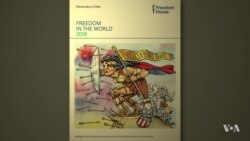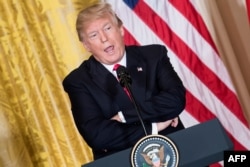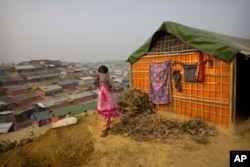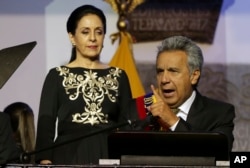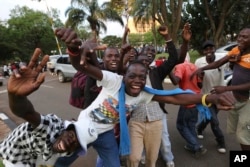A new report released by the independent watchdog organization Freedom House says that democratic principles such as election integrity and freedom of the press are weakening globally for the 12th consecutive year.
"There are more countries — in the case of 2017, many more countries — that showed declines in freedom than showed improvements," says Arch Puddington, Freedom House Distinguished Scholar for Democracy Studies, who spoke with VOA ahead of the report’s release.
WATCH: Freedom in the World 2018
According to Freedom House, which analyzed data from 195 countries over the 2017 calendar year, 88 countries were rated "free," 58 countries were rated "partly free," and 49 countries were rated "not free" in its latest report.
North America
Among the report's major findings was the weakening of the United States as a champion of democracy, a standing further complicated by the ongoing special counsel’s investigation of Russian interference in the 2016 presidential election.
"There are problems with the elections that you don’t find in most well-established democracies," says Puddington, who cited excessive money in campaigns and state laws making voting more difficult as major factors that can undermine the electoral process.
In its assessment of the U.S., Freedom House pointed to ethical quandaries facing the current administration, including the Trump family’s business ties and the potential for conflicts of interest, as well as the president’s decision not to disclose his tax returns.
The White House has cited an ongoing tax audit as a factor in not releasing Trump's tax returns.
Asia
Freedom House highlighted the intensification of repression under Chinese leader Xi Jinping as a contributing factor in the country’s overall downward trend and "not free" ranking.
"We’ve noticed efforts by China to influence the way other countries deal with China, talk about China, what scholars write about China, what journalists write about China," says Puddington. "We see a kind of creeping policy of trying to expand the Chinese censorship system that is pervasive inside China to other countries such as Australia, New Zealand, Canada, even the United States, not to mention Asian countries who are neighbors of China, as well."
In "partly free" ranked countries like Myanmar, experts say the findings are mixed, citing the country’s transition from military rule toward democracy with its worsening humanitarian crisis following the mass exodus of Rohingya Muslims into neighboring Bangladesh.
Latin America
Even with economic and political instability in Nicaragua and Venezuela, Freedom House experts say there’s positive developments for the rest of the region.
"The new [Ecuadorean] president Lenin Moreno has dismantled some of the measures that his predecessor had put in place," says Puddington, adding "he’s also shown a willingness to have a serious dialogue with reformist elements in the country and to prosecute officials for corruption."
Even with increased engagement with the U.S., Freedom House upheld Cuba’s "not free" ranking, pointing to freedom of the press and open debate as one area needing improvement.
Middle East
Despite "not free" rankings and ongoing wars in Iraq and Afghanistan, Freedom House highlighted both as countries to watch throughout 2018.
"It doesn't necessarily mean that the country is moving in the wrong direction or in the right direction," says Puddington. "It just means that there are a lot of things going on in that country. And we anticipate that there will be changes in the next year."
Analysts say progress toward democratic elections and effective civilian governments could signal major developments for both countries in the months ahead.
Africa
Following the ouster of Zimbabwe’s longtime leader Robert Mugabe, Freedom House ranked the country "partly free" overall.
"Zimbabwe declined in our scores for 2017, but this was largely due to the fact that President Mugabe was pushed out by non-democratic means, and he was succeeded through non-democratic means," says Puddington, adding, "We do hope that some of the promises that have been made of reform and liberalization and serious Democratic elections are fulfilled. If they are, we will see improvements in Zimbabwe’s scores."





